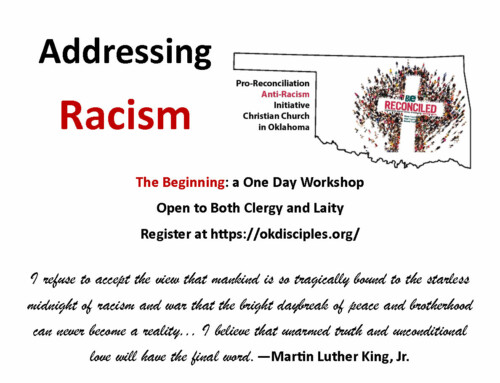Meditation on Racism
By Rev. Bill Inglish (retired)
Member, Disciples Christian Church, Bartlesville
Other than Mickey Mantle, my first childhood sports hero was basketball player Bob Cousy. A guard for the Boston Celtics in the 50s and early 60s, Cousy was known as “the Houdini of the Hardwood” for his sleight-of-hand passing, ability to look one way while throwing another, perplexing his opponents and setting up easy baskets for his teammates.
But despite Cousy’s exceptional talent, the Celtics didn’t become the NBA’s dominant team until drafting six-foot-ten Bill Russell, who became one of the greatest defensive and team players in the game’s history. Together, Cousy and Russell made the Celtics a force to be reckoned with, a dynasty.
Now Cousy was white and Russell black, but Cousy didn’t have a bigoted bone in his body. At a time when black players were almost a novelty and Jim Crow’s segregation was the law of the land, Cousy was known by blacks as being a good guy—despite never taking a public stand against racism or associating off the court with his African American teammates.
Russell, on the other hand, was a proud, opinionated black man who wore his anger on his sleeve, taking a public position on civil rights, being forcefully outspoken about his support for Dr. Martin Luther King and the struggles of blacks for equality—a stance that in those days did not win him the admiration of white fans in many places, including Boston.
Though Cousy and Russell were teammates and friends of a sort, they were never close, not when they played together, not after their careers ended, seldom seeing each other through the years. But at the age of 87, Cousy felt the need to apologize to Russell, doing so in a hand-written letter, saying that he wished he’d said more or done more to express his sympathy for Russell’s plight and that of other African Americans.
Racism in America is not now what it was when Cousy and Russell were becoming basketball legends—a black man has, after all, been twice-elected president—but racism has hardly been defeated. Prejudice is alive and well, and hate crimes are clearly on the rise, targeting not only African Americans but also Muslims, members of the LGBTQ community and other minorities. And in the midst of it all, I find myself identifying with Cousy.
I am a white, 68-year-old male who has never been the victim of discrimination a day in my life. I have a handful of black, Muslim and LGBTQ acquaintances, but I’ve never stood with them in any meaningful way to witness for equality and justice. And though I’ve thought to myself that I should say more and do more, I’ve appeased myself by saying I will pray for them.
But then I think of the admonition of our denomination’s founder, Alexander Campbell: “To get on your knees and pray for anything that you will not then stand up and work for is an insult to God and a disappointment to yourself.”


